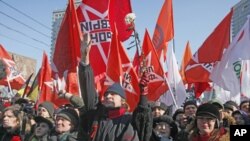Thousands of Russian demonstrators converged on central Moscow Saturday, protesting President-elect Vladimir Putin's third term in office amid allegations of election fraud.
Russia’s opposition had everything: brilliant sunshine, a permit for a public protest rally, and a central location in the heart of Moscow’s entertainment district.
What they lacked were protesters. About 20,000 came to protest on Saturday - only one-fifth as many demonstrators as there were at the last democracy rally before last Sunday's election. At least 100,000 people turned out for that protest, in 20 degrees below zero (celsius) weather.
White ribbons and balloons fluttered in the wind, but the spirit of Moscow’s fifth big democracy demonstration seemed deflated by Vladimir Putin’s victory at the polls.
Officially, Putin won 64 percent of the vote. Voter watchdog groups give him around 54 percent, but even that was enough to avoid a run-off second-round election. So in May, the two-term former president and current prime minister begins a new six-year term as Russia's head of state.
As a police helicopter hovered overhead, Ksenia Sobchak, a television personality turned dissident, told the democratic faithful that they have to move beyond the slogan “Russia Without Putin.”
She said democracy advocates have to show what they are for: an independent judiciary, a free press, and elections for mayors and governors.
The stage and sound system were decorated with posters that read: "These are not elections" and "This is not a president."
But speaker after speaker warned that Russia’s path to democracy will pass through a long slog of building political parties and building a strong civil society.
Vera Kichanova, a 20-year-old journalism student who won a district council election, addressed the crowd. She urged young people to get involved in politics and in neighborhood groups.
From a different generation, Garry Kasparov, the 48-year-old chess grandmaster, urged democracy advocates to persevere.
Kasparov, a seven-year veteran of opposition politics in Russia, told protesters not to get discouraged and not to concede defeat.
The rally showed how Russia's anti-Putin coalition is mutating.
At one point nationalists in the crowd marched out the authorized protest in a group. The Russkiye supporters marched a few hundred meters to the Old Arbat pedestrian mall and lit flares in the midst of throngs of tourists strolling in the sun. Police detained about a dozen of them.
Elsewhere this weekend, activists are negotiating the formation of a new democracy party. Two liberal groups, Yabloko and Parnas, are debating whether to join forces with Mikhail Prokhorov, the billionaire businessman.
Prokhorov won nearly 1 million votes in the Moscow region in Sunday's election, outpolling even Putin in the capital’s center. On Monday, Prokhorov plans to start building his own political party.
Now, after five mass rallies, there is no agreement on whether or when to hold another.
Sergei Udaltsov, a leader of the Left Front, vowed to hold a “March of 1 Million” to protest Mr. Putin’s inauguration on May 7.
The most radical speaker of the day, Udaltsov said the movement’s "weapons" will be marches, meetings and strikes. But his speech was met with only scattered applause.
After Saturday's rally Udaltsov led an unauthorized march down the New Arbat shopping street toward the Kremlin. Only several hundred protesters followed him.
When the group reached a pedestrian underground tunnel at a major avenue, police blocked their way and detained Udaltsov and several others.




